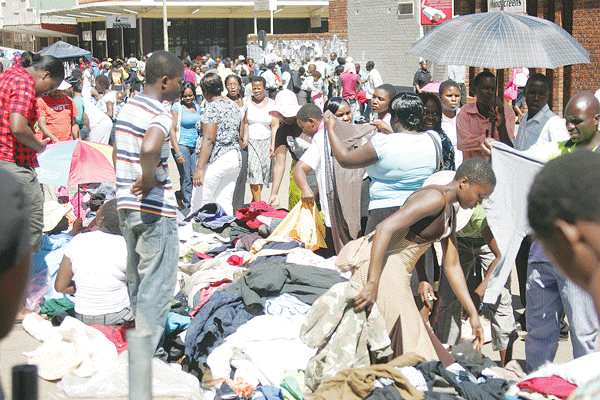
Government’s decision to effect 30% duty on imported cotton fabrics beginning January 1, 2018 to safeguard the local clothing industry which has taken a severe knock from the influx of cheap imports, is timely.
NEWSDAY COMMENT
However, it is important for government to appreciate that the ordinary majority were forced to rely on these cheap imports because clothes in traditional fashion shops have been priced beyond their reach.
This forced the ordinary poor citizens of this country to rely on the cheaper informal markets such as Mupedzanhamo among other second-hand flea markets across the country.
It is not by choice that Zimbabweans decided to rely on the informal market for their clothing, but it is due to the unrelenting economic hardships spawned by the previous Zanu PF government’s misrule and poor economic policies that favoured the country’s elite.
Hence, this is something that President Emmerson Mnangagwa’s government has to look into, in order to spread the benefits of the economy to the ordinary citizens.
Although Finance minister Patrick Chinamasa indicated in his 2018 National Budget statement that the textile manufacturing industry was facing stiff competition from cheaper imports, we are wary of protectionist tendencies by government, as it seeks to cushion an otherwise cannibalistic industry that pays no regard to the socio-economic hardships afflicting the ordinary citizens.
We believe the policy, if not implemented in a proper way, may mean that ordinary people will not be able to afford to buy clothing items for their families.
- Chamisa under fire over US$120K donation
- Mavhunga puts DeMbare into Chibuku quarterfinals
- Pension funds bet on Cabora Bassa oilfields
- Councils defy govt fire tender directive
Keep Reading
Once such a policy to hedge the industry is in place, with support from the government, the proper thing to do would be to ensure that ordinary citizens are able to benefit as well. It should not be a privilege for selected few, as happened in the past.
It is also noteworthy that the informal clothing sector has provided employment opportunities to many people that the formal economy has failed to absorb, due to the shrinking job market on the back of massive company closures over the past decade or so.
It is critical to ensure that once the policy takes effect, these many people will not suddenly find themselves out of jobs. The informal sector has become the biggest employer and a larger chunk of these people are in the second-hand clothing industry.
We urge government to crack the whip on errant businesses in the clothing industry to avoid profiteering at the expense of the majority, now that imports will be restricted due to the import duty.
Zimbabweans hunger for a time when the economy can begin to peak again and benefit every sector, something which will benefit the majority.











